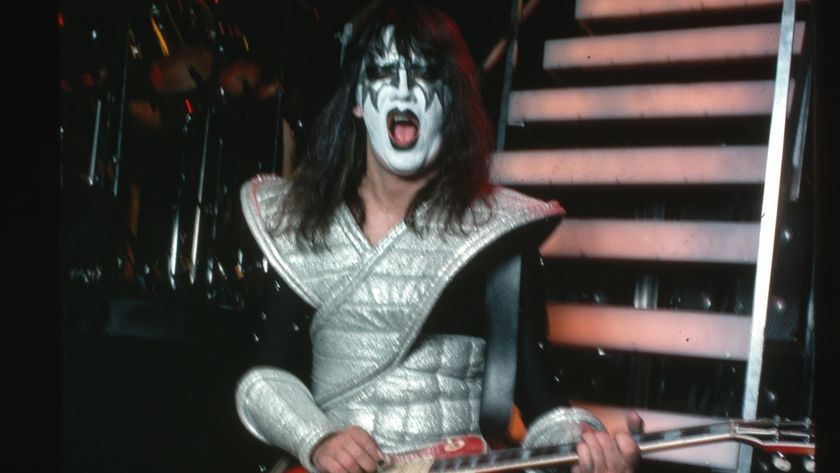Zeal & Ardor’s Manuel Gagneux and Tiziano Volante on hijacking Fractals, super-dumb riffs and being voted MusicRadar’s Best Metal Guitarists 2022
“I have to address this, on a technical level, we are nowhere near that list!” says Gagneux. “Like, Abbath? If you listen to Polyphia, it is a whole different ballgame”

When we catch up with Manuel Gagneux and Tiziano Volante of Zeal & Ardor, backstage at Klub Močvara in the Croatian capital Zagreb, there’s a little confusion at first. Oh, they know why we’re calling. We’re talking because MusicRadar readers voted Gagneux and Volante the best metal guitarists of 2022.
But in what has been a banner year for box office metal, with albums from Slipknot, Lamb of God, Megadeth and Machine Head, in which the short list also features the likes of Abbath and Meshuggah’s Mårten Hagström and Fredrik Thordendal, these guys just find it a little silly that they’re even in the conversation. Gagneux goes as far as to call foul play.
He has a point. Neither are technicians. If you are looking for someone to light up the fretboard, you’d call someone else. Zeal & Ardor’s sound needs something else.
Constructed by Gagneux from the ground up, the Zeal & Ardor sound relies on the hypnotic as much as it does the primal physicality of metal. It sublimates elements of the black metal aesthetic, drawing upon the African American spiritual for inspiration. Zeal & Ardor operate at a remove from metal orthodoxy.
Released on 11 February, the band’s third and self-titled studio album plays like a definitive statement on who they are. Tracks such as Run and Death To The Holy deploy guitars as a primal thunder, uncomplicated but urgent riffs running circle’s round Gagneux’s verse, all tension and anxiety and momentary release.
Others use the electric guitar as texture – the beat and the lyrics, but especially the lyrics, taking precedence. As Gagneux explains, one informs the other. The guitar will find its place in the song but it won’t be calling attention to itself. It’s not that kind of metal band. That's not their style as metal players. And that’s really why they find all this attention so funny.
You’ve been voted best metal guitarists of 2022 by MusicRadar readers and judging by your faces, that news strikes you as surreal? What do you say to those who voted for you?
Get the MusicRadar Newsletter
Want all the hottest music and gear news, reviews, deals, features and more, direct to your inbox? Sign up here.
Tiziano Volante: “Well, thanks to those who have gone crazy on the voting side of things, I guess!”
You’re laughing but it is interesting, and maybe this is a sign of how far metal guitar has evolved, because, in a sense, you subvert the traditional idea of how it should sound.
Apart from guitar nerds, it is maybe not that interesting to have very technical music that is just there to fuck with your head
Tiziano Volante
Manuel Gagneux: “There is a part of that, trying new things, but I have to address this, on a technical level, we are nowhere near that list. There are artists like Abbath, for instance! Even just scrolling down the list I see guitarists who are far better than I am. Tiziano is far better than I am. But if you listen to Polyphia or things like that, it is a whole different ballgame.”
Volante: “I think the nice thing about it would be to see that maybe the shift goes away from the whole guitar wankery aspect, back to songwriting, and actually conceptual music, or something that really isn’t on that technical level. Apart from guitar nerds, it is maybe not that interesting to have very technical music that is just there to fuck with your head. I mean, we lean on that sometimes but we’re not just that.”
You can be as primitive as you want. You have that freedom if you’re not thinking about it as metal guitar.
Gagneux: “Yeah, I guess, to a certain degree, and I think that it shines when we play live, because obviously on the record I do most of it but I don’t give it as much intent as when we get together and [Tiziano] has time to sit and stew over it, and kind of widens the horizon tenfold.”
Volante: “Yeah, it’s two different worlds. Whatever happens in the production process is usually more kind of the producer approach than, let’s say, the jamming band, or something like that. Not even as the Guitar Pro, let’s maybe tab it all out and let’s learn it. I mean, the process I see when Manuel works is more coming from remix culture, and just fucking around with things.”
Gagneux: “Pretty much.”

Volante: “And then demos are done, then preproduction, then the full thing is done. And then the second step is to translate that into a live setting and usually that’s when… My work starts! [Laughs] Because it’s a bunch of guitar tracks, and we are just two people, and we try to not rely on backing tracks as much as we can – which I think we do quite well, so far. There is this translation to the live setting, and there, I mean, sound-wise, it is very limited to be honest.
“We have a setup that is very old because we basically hijack the Axe-Fx to have two inputs from the get-go, because we needed to be able to fly with our rig and that was a very cheap and efficient way to have both organised on one unit so the whole selection of presets was basically mapped out, and both of us have combinations that work out.
Things like the Fractal Audio invite you to go into the rabbit hole of sounds, which I am very prone to doing
Tiziano Volante
“That has been more of less laid out ever since so I guess there is not really that much space to really fuck around with weird sounds – it’s just combinations of clean and overdriven sounds, and reverb tails, and the only crazy thing that is going on in my side is an octaver, and we used to play a song where I had a harmoniser for a lead part, but just for that, and now we have switched that out for a part where he has the first clean part and I am overdriven.
“Other than that there isn’t much to it. Sound-wise, I try to capture what he did on the album with the limitations we have with our setup, which is kind of nice, because things like the Fractal Audio invite you to go into the rabbit hole of sounds, which I am very prone to doing. It is good to have limitations. Usually it’s time, with preproduction, the tour, whatever, and then going out on the road it is a lot of back and forth with our front-of-house people. ‘Okay, this sounds nice. This works. Okay, maybe this does not sound so cool.’”
Those limitations can be critical. They can really help you make decisions about what you want to do with the sound. You also give some space in the mix with that approach as opposed to piling things up on top of each other.
Gagneux: “It is also a question of focus, because for my songwriting, it has to exist in this world, and like you said having limitation stirs creativity, and I think that is what’s happening with us to a certain degree.”
You said you are not as technical as Polyphia, and that’s true, but what’s interesting is the process you describe is a lot like theirs; they approach it with a similar sensibility, like the remix culture Tiziano was talking about. Maybe that is where the radicalism is, thinking of guitar parts as something useless until given context.
Gagneux: “To a certain degree, it’s that, yeah. You have like a LEGO piece, which might be a guitar loop or a bass lick or whatever, and then you have to – like you said – make it less horrible with context!”
The context is where the beauty lies
Volante: “Well, that’s The Devil Is Fine right there, I’d say. Like, that is just really good songs, and they sound crappy as hell! I cannot listen to that record, personally.”
Gagneux: “It is horribly mixed. I did it all by myself, so if you crank it loud you will hurt your ears, but…
I will say something, I have a lot of stupid riffs, that make me question why anybody hasn’t done this dumb riff yet
Manuel Gagneux
Volante: “The idea is the idea, and the songs come through. It doesn’t really matter. For me, it was really eye-opening getting into this project. A lot of guitarists really have the problem of micro-managing things, and getting into the gear hype of things, and it’s like, ‘But did you write a song? Did you actually do something with it?
“I mean, there is some point to just noodling along with yourself and having fun with gear, but still, at the end of the day, that’s not much of our concern. Being on the road, the highest goal is that everything works!”
Gagneux: “Things just need to work. That is the first and foremost. That is the biggest criterion. Things need to work.”
Volante: “Your pickups need to work. Your guitar needs to work. Because if they don’t, they are useless. With Zeal & Ardor, there is such a focus on the vocal parts that the guitars are more kind of the glue that holds things together, also with the bass.”
It's like the guitar and the vocals are creating the atmosphere for each other to inhabit. It’s like this sort of eco-system, world building so the story of the song is more powerful.
Gagneux: “Yeah, both serve both roles at times, this push/pull thing.”
And it can be more atmospheric than trying to be physical with the riff.
Gagneux: “It all stems from me not being able to play more complicated stuff. My fingers are dumb, and that just makes me aim for an emotion rather than a riff, I guess.”
Is there a track on this record that would justify you being voted best metal guitarist?
Gagneux: “I will say something, I have a lot of stupid riffs, that make me question why anybody hasn’t done this dumb riff yet. They are so simple that it is basically… I was struggling with this, like, ‘Is this already taken? Is this available?’ Götterdämmerung, for instance. Trust No One? It’s just the most dumb-dumb. It’s not even LEGO. It’s LEGO DUPLO. That’s what it feels like! [Laughs] But I am proud of those because they are simple and they very much get the job done.”
Volante: “Yeah, they fucking work!”
Gagneux: “They work in a live setting. That’s what I want. When I go to see bands that are super noodly in their aesthetic, and of course, sometimes they have great front-of-house situations and it cuts through, but so often it gets lost in the mix. Super-dumb riffs translate very well because it is heavy air moving towards your guts and face.”
Is that when the songs first feel done, when you play them at high volume together? Or is there a sense that these songs are never done, that they’ll forever evolve in a live setting?
Gagneux: “There’s two points. Like, when I’ve done the record version it’s like, ‘Yeah, this is done.’ Then we play in rehearsals and it’s like, ‘Wait, this is far from done. This is going to be way better.’ Because it’s more than one person, and of course this guy helps immensely, and then we have the baptism [live] – that sounds cheesy – but it just gets better, more gooder with people.”
Maybe once people and volume are introduced, that’s when you first properly feel the song, as opposed to it being an intellectual idea on a piece of paper…
Volante: “Yeah, but even then it still works. The songs themselves, they seem to work. Of course, for the life setting, maybe other characteristics get added to it, so it evolves and gets more depth because everybody else adds their stuff to it. But all the songs work right before then.”
This is a self-titled record. Did it feel like a definitive record, almost like a second debut?
Gagneux: “Yeah, it is going in that direction because I feel like we found our sound, or like a definitive sound on this record, which is why I self-titled it. Also, we didn’t have too many great ideas for names – but that’s besides the point! [Laughs] I think we really grew into ourselves, especially with these [shows]. By the end of the week, that will be 80 gigs this year, and I think we have never sounded tighter by sheer repetition.”
What are you playing live at the moment?
Gagneux: “I have an Aristides Raw 060, which I will soon replace with a signature one because I am the best metal guitarist in the world right now! [Laughs]”

What is the body made out of on that?
Gagneux: “It is a bespoke polymer mix that they are very secretive about [Arium]. It is super lightweight. The output is mad hot.”
Volante: “I am not a fan of the Fishman [pickup].”
Gagneux: “Mmm I like them. It’s a very dynamic pickup that likes treble and presence. It’s good.”
Volante: “It kind of has this Tube Screamer quality to it. I don’t really like it, but it really makes sense for his guitar and the lead parts. They really cut through. I am actually playing the same thing but in a seven-string. On this tour it’s my third [guitar]. My second would be my mod I made out of the cheapest Jackson seven-string, the Dinky JS32.”
A post shared by Tiziano Volante (@_tizizit_)
A photo posted by on
What did you do to the Jackson seven-string guitar?
Volante: “I sharpened the horns on it, because they were not pointy, and then I wrapped them in aluminium tape. It looks dumb, but kind of fun. And then the main guitar I play is a guitar that I designed but a friend of mine realised. He is a local luthier in Basel. His company is called Aeschbach Guitars. It looks like a Strandberg with Iceman horns.”
It’s good that you have some grown-up guitars and then some you can wrap up in tape and bastardise. That’s the platonic ideal.
Volante: “The Aeschbach is astonishingly durable so far. That guitar has been on the road for quite some time and taken a beating. We actually did a refinish of the whole thing, so now it has kind of a lacquer but you see the grain.”
Gagneux: “It is insanely lightweight.”
Volante: “Super lightweight, it sounds great with the EMG-Xs now. For touring, I would aim for the most similar setup from guitar to guitar, just having the string action as close as possible, and sometimes the width of the neck or the [fingerboard] radius prevents the identical setup but I try to keep it as similar as possible.”
If not you, who should have won best metal guitarist in 2022? Which guitar players should we all be checking out?
Gagneux: “I think anyone from Polyphia would have been a stellar candidate.”
Volante: “Abbath.”
Gagneux: “And just Marc Ribot, because I love Marc Ribot so much.”
Volante: “She wasn’t on the list, but I would say Debbie [Gough] from Heriot.”
Gagneux: “Fuck yeah! Debbie from Heriot. She is a force to reckon with.”
Volante: “She’s incredible.”
Gagneux: “Like, she would put us to bed. She’s insanely good.”
- Zeal & Ardor is out now via MVKA
Jonathan Horsley has been writing about guitars and guitar culture since 2005, playing them since 1990, and regularly contributes to MusicRadar, Total Guitar and Guitar World. He uses Jazz III nylon picks, 10s during the week, 9s at the weekend, and shamefully still struggles with rhythm figure one of Van Halen’s Panama.

“Those arpeggios... That was the sickest thing I ever heard”: Yngwie Malmsteen on why guitarists should take inspiration from players of other instruments if they want to develop their own style

“I used a flange on the main riff and a wah-wah on the solo. I just said, ‘Hit the record button and I’ll let it rip!’”: Kiss legend Ace Frehley on his greatest cult classic song










